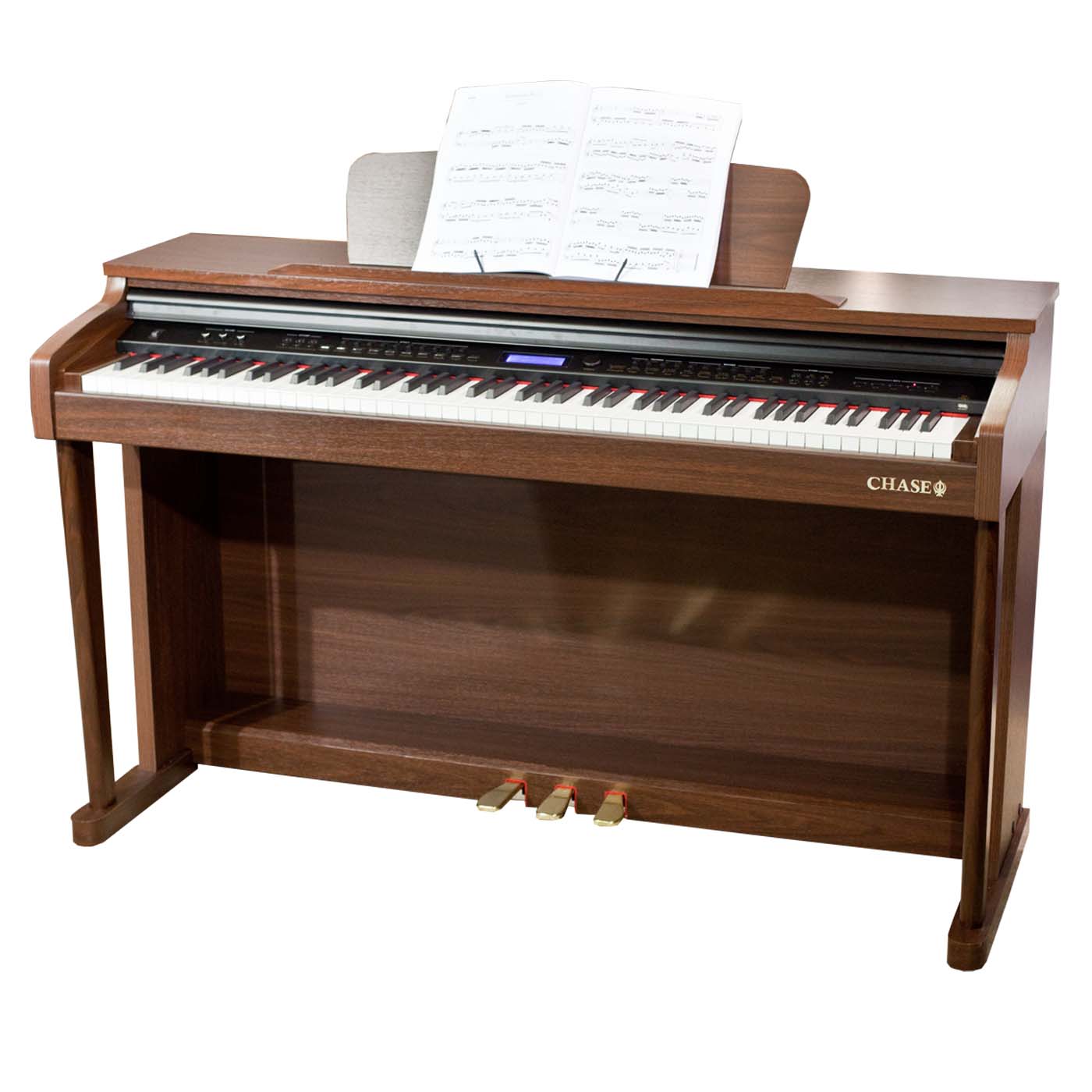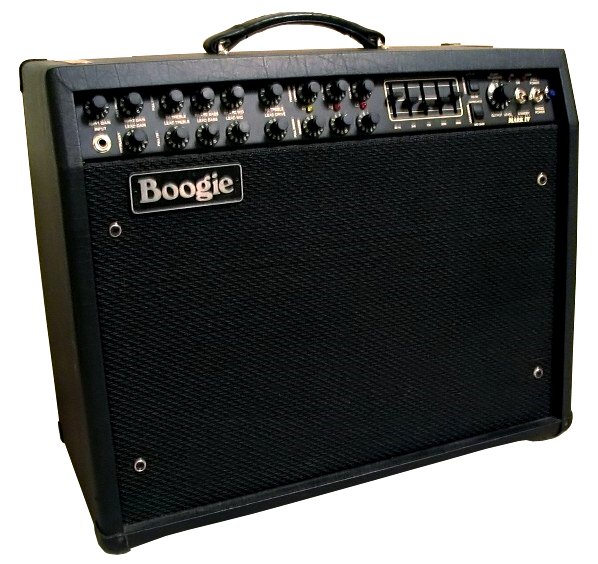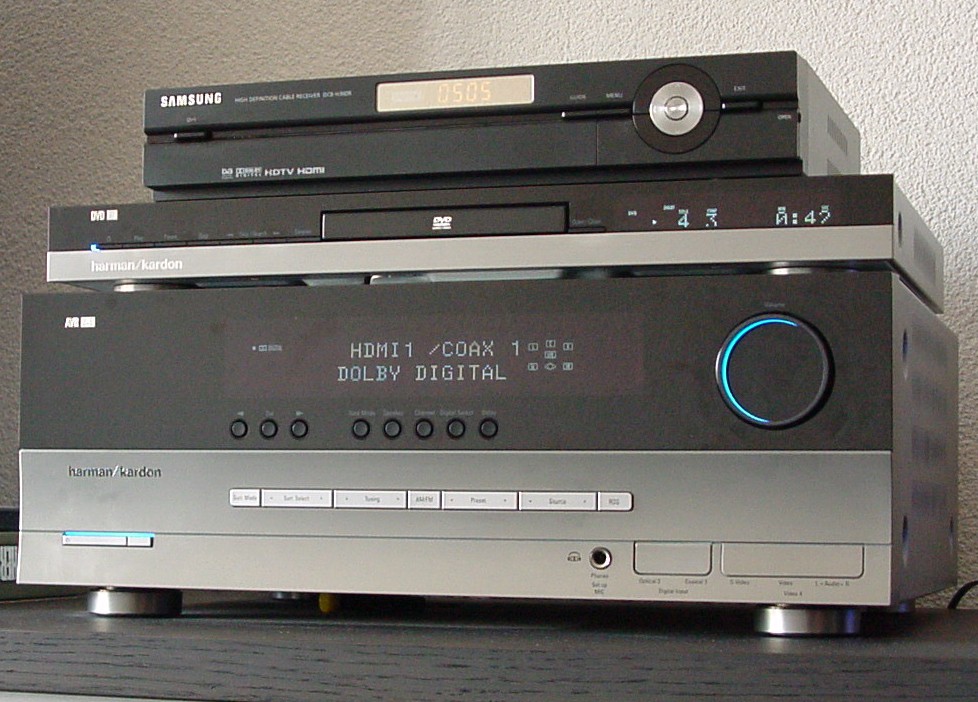|
Instrument Amplifiers
An instrument amplifier is an electronic device that converts the often barely audible or purely electronic signal of a musical instrument into a larger electronic signal to feed to a loudspeaker. An instrument amplifier is used with musical instruments such as an electric guitar, an electric bass, electric organ, synthesizers and drum machine to convert the signal from the pickup (with guitars and other string instruments and some keyboards) or other sound source (e.g, a synthesizer's signal) into an electronic signal that has enough power, due to being routed through a power amplifier, capable of driving one or more loudspeaker that can be heard by the performers and audience. Combination ("combo") amplifiers include a preamplifier, a power amplifier, tone controls, and one or more speakers in a cabinet, a housing or box usually made of hardwood, plywood or particleboard (or, less commonly, moulded plastic). Instrument amplifiers for some instruments are also available withou ... [...More Info...] [...Related Items...] OR: [Wikipedia] [Google] [Baidu] |
Electronic Amplifier
An amplifier, electronic amplifier or (informally) amp is an electronic device that can increase the magnitude of a Signal (information theory), signal (a time-varying voltage or Electric current, current). It may increase the power (physics), power significantly, or its main effect may be to boost the voltage or current (power amplifier, power, voltage or current amplifier). It is a two-port network, two-port electronic circuit that uses electric power from a power supply to increase the amplitude of a signal applied to its input terminals, producing a greater amplitude signal at its output. The ratio of output to input voltage, current, or power is termed gain (electronics), gain (voltage, current, or power gain). An amplifier, by definition has gain greater than unity (if the gain is less than unity, the device is an attenuator (electronics), attenuator). An amplifier can either be a separate piece of equipment or an electrical circuit contained within another device. Amp ... [...More Info...] [...Related Items...] OR: [Wikipedia] [Google] [Baidu] |
Acoustic Guitar
An acoustic guitar is a musical instrument in the string family. When a string is plucked its vibration is transmitted from the bridge, resonating throughout the top of the guitar. It is also transmitted to the side and back of the instrument, resonating through the air in the body, and producing sound from the sound hole. The original, general term for this stringed instrument is ''guitar'', and the retronym 'acoustic guitar' distinguishes it from an electric guitar, which relies on electronic amplification. Typically, a guitar's body is a sound box, of which the top side serves as a sound board that enhances the vibration sounds of the strings. In standard tuning the guitar's six strings are tuned (low to high) E2 A2 D3 G3 B3 E4. Guitar strings may be plucked individually with a pick (plectrum) or fingertip, or strummed to play chords. Plucking a string causes it to vibrate at a fundamental pitch determined by the string's length, mass, and tension. (Overtones are also pres ... [...More Info...] [...Related Items...] OR: [Wikipedia] [Google] [Baidu] |
Digital Piano
A digital piano is a type of electronic keyboard instrument designed to serve primarily as an alternative to the traditional acoustic piano, both in how it feels to play and in the sound it produces. Digital pianos use either synthesized emulation or recorded samples of an acoustic piano, which are played through one of more internal loudspeakers. They also incorporate weighted keys, which recreate the feel of an acoustic piano. Some digital pianos are designed to also look like an upright or grand piano. Others may be very simple, without a stand. While digital pianos may sometimes fall short of acoustic ones in feel and sound, their advantages include being smaller, weighing much less, and costing less than an acoustic piano. In addition, they do not need to be tuned, and their tuning can be modified to match the tuning of another instrument (e.g. a pipe organ). Like other electronic musical instruments, they can be connected to an amplifier or a PA system to produce a sound ... [...More Info...] [...Related Items...] OR: [Wikipedia] [Google] [Baidu] |
Keyboard Amplifier
A keyboard amplifier is a powered electronic amplifier and loudspeaker in a wooden speaker cabinet used for amplification of electronic keyboard instruments. Keyboard amplifiers are distinct from other types of amplification systems such as guitar amplifiers due to the particular challenges associated with making keyboards sound louder on stage; namely, to provide solid low-frequency sound reproduction for the deep basslines which keyboards can play ''and'' crisp high-frequency sound for the high-register notes. Another difference between keyboard amplifiers and guitar/bass amplifiers is that keyboard amps are usually designed with a relatively flat frequency response and low distortion. In contrast, many guitar and bass amp designers purposely make their amplifiers modify the frequency response, typically to "roll off" very high frequencies, and most rock and blues guitar amps, and since the 1980s and 1990s, even many bass amps are designed to add distortion or overdrive to ... [...More Info...] [...Related Items...] OR: [Wikipedia] [Google] [Baidu] |
Guitar Amplifier
A guitar amplifier (or amp) is an electronic device or system that strengthens the electrical signal from a pickup on an electric guitar, bass guitar, or acoustic guitar so that it can produce sound through one or more loudspeakers, which are typically housed in a wooden cabinet. A guitar amplifier may be a standalone wood or metal cabinet that contains only the power amplifier (and preamplifier) circuits, requiring the use of a separate speaker cabinet–or it may be a "combo" amplifier, which contains both the amplifier and one or more speakers in a wooden cabinet. There is a wide range of sizes and power ratings for guitar amplifiers, from small, lightweight "practice amplifiers" with a single 6-inch speaker and a 10-watt amp to heavy combo amps with four 10-inch or four 12-inch speakers and a 100-watt amplifier, which are loud enough to use in a nightclub or bar performance. Guitar amplifiers can also modify an instrument's tone by emphasizing or de-emphasizing certain ... [...More Info...] [...Related Items...] OR: [Wikipedia] [Google] [Baidu] |
Graphic Equalizer
Equalization, or simply EQ, in sound recording and reproduction is the process of adjusting the volume of different frequency bands within an audio signal. The circuit or equipment used to achieve this is called an equalizer. Most hi-fi equipment uses relatively simple filters to make bass and treble adjustments. Graphic and parametric equalizers have much more flexibility in tailoring the frequency content of an audio signal. Broadcast and recording studios use sophisticated equalizers capable of much more detailed adjustments, such as eliminating unwanted sounds or making certain instruments or voices more prominent. Since equalizers "adjust the amplitude of audio signals at particular frequencies" they are, "in other words, frequency-specific volume knobs." Equalizers are used in recording studios, radio studios and production control rooms, and live sound reinforcement and in instrument amplifiers, such as guitar amplifiers, to correct or adjust the response of micro ... [...More Info...] [...Related Items...] OR: [Wikipedia] [Google] [Baidu] |
Public Address System
A public address system (or PA system) is an electronic system comprising microphones, amplifiers, loudspeakers, and related equipment. It increases the apparent volume (loudness) of a human voice, musical instrument, or other acoustic sound source or recorded sound or music. PA systems are used in any public venue that requires that an announcer, performer, etc. be sufficiently audible at a distance or over a large area. Typical applications include sports stadiums, public transportation vehicles and facilities, and live or recorded music venues and events. A PA system may include multiple microphones or other sound sources, a mixing console to combine and modify multiple sources, and multiple amplifiers and loudspeakers for louder volume or wider distribution. Simple PA systems are often used in small venues such as school auditoriums, churches, and small bars. PA systems with many speakers are widely used to make announcements in public, institutional and commercial buildings ... [...More Info...] [...Related Items...] OR: [Wikipedia] [Google] [Baidu] |
AV Receiver
An audio/video receiver (AVR) is a consumer electronics component used in a home theater. Its purpose is to receive audio and video signals from a number of sources, and to process them and provide power amplifiers to drive loudspeakers and route the video to displays such as a television, monitor or video projector. Inputs may come from a satellite receiver, radio, DVD players, Blu-ray Disc players, VCRs or video game consoles, among others. The AVR source selection and settings such as volume, are typically set by a remote controller. Usage The term "receiver" basically refers to an amplifier, typically at least a two-channel stereo model, that has a built-in radio tuner. With A/V receivers, the basic functionality is to receive an audio signal, amplify the audio signal to drive multiple speakers, and allow pass-through of the corresponding video signal to a display device such as a projector or a television. The receiver performs tasks that would otherwise require numerou ... [...More Info...] [...Related Items...] OR: [Wikipedia] [Google] [Baidu] |
Country Music
Country (also called country and western) is a genre of popular music that originated in the Southern and Southwestern United States in the early 1920s. It primarily derives from blues, church music such as Southern gospel and spirituals, old-time, and American folk music forms including Appalachian, Cajun, Creole, and the cowboy Western music styles of Hawaiian, New Mexico, Red Dirt, Tejano, and Texas country. Country music often consists of ballads and honky-tonk dance tunes with generally simple form, folk lyrics, and harmonies often accompanied by string instruments such as electric and acoustic guitars, steel guitars (such as pedal steels and dobros), banjos, and fiddles as well as harmonicas. Blues modes have been used extensively throughout its recorded history. The term ''country music'' gained popularity in the 1940s in preference to '' hillbilly music'', with "country music" being used today to describe many styles and subgenres. It came to encomp ... [...More Info...] [...Related Items...] OR: [Wikipedia] [Google] [Baidu] |
Blues
Blues is a music genre and musical form which originated in the Deep South of the United States around the 1860s. Blues incorporated spirituals, work songs, field hollers, shouts, chants, and rhymed simple narrative ballads from the African-American culture. The blues form is ubiquitous in jazz, rhythm and blues, and rock and roll, and is characterized by the call-and-response pattern (the blues scale and specific chord progressions) of which the twelve-bar blues is the most common. Blue notes (or "worried notes"), usually thirds, fifths or sevenths flattened in pitch, are also an essential part of the sound. Blues shuffles or walking bass reinforce the trance-like rhythm and form a repetitive effect known as the groove. Blues as a genre is also characterized by its lyrics, bass lines, and instrumentation. Early traditional blues verses consisted of a single line repeated four times. It was only in the first decades of the 20th century that the most common current str ... [...More Info...] [...Related Items...] OR: [Wikipedia] [Google] [Baidu] |
Fender Bassman
The Fender Bassman is a bass amplifier series introduced by Fender during 1952. Initially intended to amplify bass guitars, the 5B6 Bassman was used by musicians for other instrument amplification, including the electric guitar, harmonica, and pedal steel guitars. Besides being a popular and important amplifier in its own right, the Bassman also became the foundation on which Marshall and other companies built their high-gain tube amplifiers. History The 5B6 Bassman During 1952, the Fender 5B6 Bassman amplifier was introduced as a combo amplifier cabinet that included the amplifier chassis combined with one 15" speaker. The 1952–1954 5B6 Bassman amplifiers had two 6SC7 or 6SL7GT pre-amp tubes, two 5881 power tubes and a single 5U4G rectifier tube. It was designed to generate 26 watts at an 8 ohm impedance load, and offered a cathode-based bias. From 1952 through the spring of 1954, Fender produced approximately 660 model 5B6 Bassman amplifiers (serial numbers #0001–0660). ... [...More Info...] [...Related Items...] OR: [Wikipedia] [Google] [Baidu] |




.jpg)





